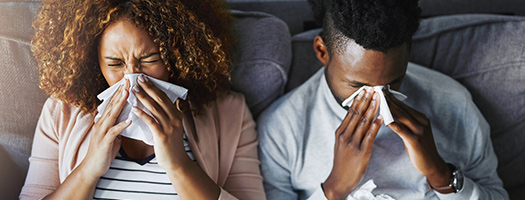Keeping older loved ones mentally and physically healthy during COVID-19

People older than 60 have been identified as high risk for severe illness if they become infected with COVID-19. How can families best take care of their loved ones, both mentally and physically during enhanced containment measures? Dr Ryan Fuller has a few pointers.
South African psychiatrist, Dr Ryan Fuller, who specialises in managing the mental health of older adults, shares his thoughts on clinical research currently being done around the impact of COVID-19 on elderly populations, as well as some thoughts and tips for families to care for loved ones who are older than 60.
Key advice to keep our elderly loved ones mentally and physically healthy during COVID-19. Ep 4:
The importance of protecting our older populations
Numerous clinical studies have already indicated that populations over the age of 60 are more susceptible to more severe disease, and have an increased risk of serious health complications.
Dr Fuller points out that people who reside in long-term care facilities, such as retirement or frail-care homes “often have chronic underlying medical conditions”, which increases the overall risk associated with age. Added to this, healthcare professionals frequent these care facilities, coming and going daily in order to fulfil their occupational responsibilities. There is a degree of increased risk if any of these care workers contract an infection.
According to Dr Fuller, this is why most long-term facilities in the country are currently observing strict lockdown procedures. Residents are not permitted to leave, no new residents are being accepted, and many carers have been given the option to ‘live in’ during the stay-at-home period. This way, risk can be dramatically minimised and people better protected.
The more protection buffers can be implemented, the better, as research has continuously highlighted the severe nature of the risk older populations face during tis health crisis.
Dr Fuller refers to findings published in the New England Journal of Medicine on a long-term care facility in King County, Washington, United States of America. The facility reported 167 confirmed cases of COVID-19. A total of 101 of these patients were facility residents, and 50 were care workers. At least 16 cases were identified as visitors to the facility. More than half of these individuals were admitted for hospital care.
The study noted that most patients had chest and respiratory-related illness, but seven of the residents had no symptoms. The study also noted that this group of patients had pre-existing health conditions. Many of the elderly patients have hypertension (high blood pressure), heart and kidney disease, diabetes, obesity, lung conditions (such as emphysema and asthma) or cancer.
“So, this study shows us that the risk of admission because of age was over eight times higher than that of the general population,” says Dr Fuller.
The study also showed how comorbidities in admitted patients increased their risk of life-threatening illness. “Unfortunately, one third of all these elderly residents died in this study from America,” adds Dr Fuller.
“The message here is clear: COVID-19 is highly contagious for elderly residents and has a very high mortality rate.”
Dr Fuller points out that the quick response by government to place the country under very strict containment measures will already have had a more positive effect, both on the general population and also for those considered to be at greater risk.
“Thankfully, long-term facilities that I’m aware of in Johannesburg have implemented appropriate infection prevention and control measures. I’m sure the same has been done throughout South Africa,” he says.
“However, the risk for rapidly escalating outbreaks remains very high and we all need to do our bit by staying at home and observing physical distancing.”
What are the physical signs and symptoms families should look out for?
Some families will have moved in together for the stay-at-home period to better take care of loved ones during containment. Others have taken the stance that older loved ones are perhaps safest in their own homes or care facilities.
So, how can families take care of the physical health of their older loved ones in either scenario?
First, Dr Fuller reminds us of the most common physical signs and symptoms everyone needs to be aware of during this pandemic. These include:
- A cough, which is predominantly persistent and dry, but can also be painful due to wheezing spasms. Some patients have reported experiencing a more wet cough with sputum.
- A fever of 38°C or higher
- Fatigue or tiredness (general malaise) that continues even without any obvious cause
- Shortness of breath or difficulty breathing
- Muscle aches
- Sore throat
- Headache
- Body chills
Less common, but have also been experienced include a loss of appetite, loss of taste and smell, nausea, vomiting and diarrhoea.
Families who are currently living under the same roof can easily keep an eye on any older loved ones for any one of these signs and symptoms. If you’re not currently living together, encourage honesty during telephonic or video calls with loved ones, and also check in with live-in facility carers to receive regular health updates about loved ones.
Are there any red flags families should be aware of?
Dr Fuller recommends looking out for the following:
- A fever that lingers for several days and is persistent throughout the day. A fever that is 39ºC or higher and doesn’t respond to paracetamol needs medical assessment.
- General malaise and generally feeling unwell
- Breathlessness or a shortness of breath, especially when moving about or walking
- Chest pain or pressure in the chest area
- Being cold and clammy, as well as pale, wet, spotty or mottled skin
- New confusion
- Difficulty with urination
- Changes in skin tone, particularly blueness of the lips or facial area
- Coughing up blood
- Neck stiffness
- Low blood pressure (hypotension)
- Neck stiffness
“Families should immediately call their GP or check COVID-19 guidance online. Please note a family should not simply arrive at a hospital casualty unit where they could be at risk of infecting other patients, or indeed be infected themselves. Always phone ahead,” advises Dr Fuller
What can families do to protect the mental health of their older loved ones?
Many older individuals become socially isolated as they age, with some experiencing loneliness and even depression. This can be caused by lack of social and physical contact. Added to this, a fear of the unknown can generate anxiety in many people. Families can help protect against this by being mindful to provide the support their relative really needs.
While some are in isolation on their own in care facilities, others are living in with multiple family members. This can be a bit overwhelming too. Handling either scenario may need to be delicately balanced by family members to ensure that older loved ones are neither neglected or overwhelmed.
“Just because an elderly person is not asking for help, does not mean that they are coping,” Dr Fuller points out. So, families must find ways to connect with their older loved ones in a way that eases their fears, alleviates loneliness and supports them through this period.
Some things to consider include:
- Checking in: “Ask your elderly loved one how they are feeling each day,” says Dr Fuller. “And be as positive as possible,” he adds. Positive conversation will do wonders for everyone in the family, especially seniors. If families are away from older loved ones, make it a habit to call or even video call. Once this has been set up, you can all connect together as a family via Skype, Zoom or even WhatsApp video call. This can help to bring everyone closer together by allowing you to be able to see each other.
- Encourage routine and exercise: Elderly loved ones can also benefit from structure to their day: like getting up at the same time, getting dressed, having meals at set times. Encouraging movement and some physical exercise is also healthy for seniors. If a loved one has access to a garden and is able to walk, encourage once-a-day outings. Indoor exercises for seniors is another way older loved ones can get a little physical activity into their day. “Keep it brief and don’t forget to stop immediately if they’re distressed,” advises Dr Fuller.
- Do things as a family: If older loved ones are living with the rest of the family, plan activities to do together for short periods of time. For 20 to 30 minutes at a time, families can come together to play a card game or even build a puzzle. This helps to stimulate cognitive function and is beneficial for everyone. You can also look for free online courses to do together, and learn something new. Eating meals together as a family is also a good idea. Meal times should be engaged in without mobile devices and negative conversation. If older loved ones are happy to and able, plan and prepare these meals together. Watching TV together can also bring the family together. Some may enjoy virtual game drives which can be streamed. One of those currently being run is through luxury travel experience business, Beyond, called WILDwatch Live. If not under the same roof, virtual book readings or a game of charades as a family may be fun to do together.
All medical information found on this website including content, graphics and images, is for educational and informational objectives only. Discovery Health publishes this content to help to protect and empower all South Africans by promoting a better understanding of COVID-19.
Find a healthcare professional near you
Find a doctor or hospital near you online or by using the Discovery app.
Related articles

Outbreak of the 2019 novel coronavirus
The 2019 novel coronavirus (2019-nCoV) has caused an outbreak of fatal respiratory illness first detected in Wuhan, China. This is a completely new strain with no vaccines available. The best way to prevent infection is to avoid being exposed to this virus.

A fierce flu season is expected: immunising early is the best defence
One of the best ways to be mindful of your own and others' health this March is to protect against, and prevent the spread of, the frighteningly contagious influenza virus. Here's why getting immunised early offers you the best defence.

Feeling the flu? Why and when to taper back on training
Feeling under the weather? There's a reason doctors always prescribe rest when you're ill. Here's how to be mindful of your body's needs, plus an easy way to earn 1 000 Vitality points for keeping the flu at bay with a flu vaccination.